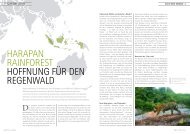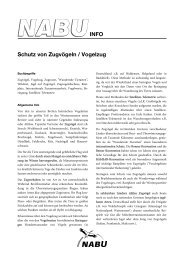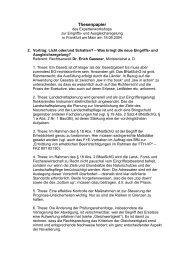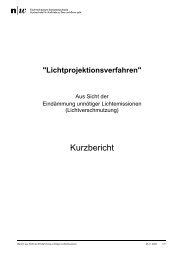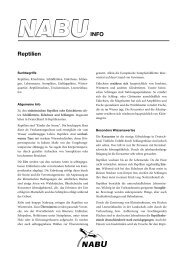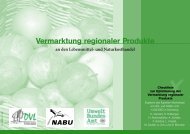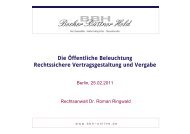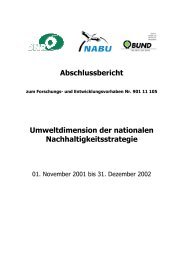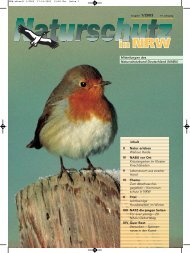Studie "The GMO-emperor has no clothes" (engl.) - Nabu
Studie "The GMO-emperor has no clothes" (engl.) - Nabu
Studie "The GMO-emperor has no clothes" (engl.) - Nabu
Create successful ePaper yourself
Turn your PDF publications into a flip-book with our unique Google optimized e-Paper software.
Poland, Bulgaria while Italy’s <strong>GMO</strong> legislation<br />
at this moment does <strong>no</strong>t allow for any<br />
cultivation of <strong>GMO</strong>s.<br />
Although there is little GM cultivation, the EU<br />
imports around 70 percent of its animal feed,<br />
most of which is GM soy and corn from the<br />
U.S.<br />
When <strong>GMO</strong>s were introduced in Europe in the<br />
late 1990s, consumers overwhelming rejected<br />
them. Ninety-five percent of Europeans wanted<br />
GM food labeled as such, and 65 percent<br />
indicated that they did <strong>no</strong>t want them in their<br />
food at all. Still today, public opposition to<br />
<strong>GMO</strong>s remains strong.<br />
After initial approvals for GM crops, mainly<br />
Bt corn, public protests forced a moratorium<br />
on approvals of <strong>GMO</strong>s which lasted until<br />
2004. Since that time, several <strong>GMO</strong>s have<br />
been approved for use as food and feed. Food<br />
products containing or derived from <strong>GMO</strong>s fall<br />
under EU mandatory labeling laws; however,<br />
animal products produced with <strong>GMO</strong>s do <strong>no</strong>t<br />
need to be labeled. This means that milk, eggs,<br />
poultry, and other such animal products do <strong>no</strong>t<br />
have to be labeled as <strong>GMO</strong> even though animals<br />
may have been fed GM grains (as <strong>no</strong>ted already,<br />
GM grains are imported from the U.S.).<br />
In 2003, a European Food Safety Authority<br />
(EFSA) was established as a centralized<br />
system to analyze risk assessments of <strong>GMO</strong>s.<br />
Legitimacy of this panel <strong>has</strong> been questioned by<br />
civil society movements and the public as the<br />
panel consists of <strong>GMO</strong> proponents and it relies<br />
solely on biotech<strong>no</strong>logy industry studies when<br />
assessing risks of <strong>GMO</strong>s.<br />
<strong>The</strong> European Commission continues to grapple<br />
with <strong>GMO</strong>s and attempts to balance policy<br />
between industry pressure and public opinion.<br />
<strong>The</strong> biotech<strong>no</strong>logy industry is exerting heavy<br />
influence with government leaders through the<br />
creation of the international lobby, International<br />
Life and Science Institute, and the ad-hoc group<br />
IFBIC, which is comprised of Monsanto, Bayer,<br />
BASF, Pioneer, and DuPont.<br />
<strong>The</strong> need to create new energy sources opens<br />
a potential new <strong>GMO</strong> frontier in Europe.<br />
Highly subsidized fuel and energy production<br />
have triggered massive investments by<br />
industrial operators and institutional investors<br />
in agricultural industries and land. This is<br />
displacing family farmers and replacing food<br />
crops with fuel crops.<br />
In addition to strong country and regional civil<br />
society campaigns against <strong>GMO</strong>s, regional<br />
governments have banded together via the<br />
Network of European <strong>GMO</strong> Free Regions. More<br />
than 50 regions have joined this Network. In<br />
addition to strong civil society and governmental<br />
regional networks, the Network of Independent<br />
Scientific Labs was created to provide technical –<br />
scientific sharing of acquired k<strong>no</strong>wledge.<br />
Specific Countries in Europe<br />
France<br />
From the time that Monsanto’s MON 810 corn<br />
was put on the European market in 1998, farmers<br />
and citizens in France have fought a fierce battle<br />
to prevent <strong>GMO</strong>s from entering their country<br />
and from entering Europe. High profile acts of<br />
civil disobedience, in some cases resulting in the<br />
jailing of leading activists, made the debate on<br />
biotech<strong>no</strong>logy a national issue, occupying centrestage<br />
of social and political public debates both<br />
in France and Europe. In many other European<br />
countries, similar anti-<strong>GMO</strong> demonstrations<br />
were undertaken by activists representing farmers’<br />
unions, environmental protection groups and<br />
consumer movements.<br />
<strong>The</strong> European network of regions opposed to<br />
<strong>GMO</strong>s created in 2005 gave a new democratic<br />
legitimacy to the fight. In 2008, after a ten-day<br />
hunger strike, the government of France declared<br />
a moratorium on the cultivation of Monsanto’s<br />
MON 810, to date the only GM variety authorized<br />
in Europe. However the fight goes on as in early<br />
September 2011, the Luxembourg-based European<br />
Court of Justice, Europe’s highest court, declared<br />
that France acted illegally when it imposed this<br />
ban as it had based its decision on the wrong EU<br />
legislation. In reaction to the ruling, France said<br />
its embargo on MON810 maize was still valid and<br />
that it would restart a procedure if needed.<br />
Germany<br />
In 2005 a first European Conference of <strong>GMO</strong> free<br />
Regions was held in Berlin, Germany. Some 200<br />
representatives from NGOs as well as regional<br />
governments, farmer unions, science and some<br />
<strong>GMO</strong> free industries attended the meeting and<br />
adopted a “Berlin Manifesto” claiming their<br />
right to decide whether or <strong>no</strong>t <strong>GMO</strong>s would be<br />
planted in their region. A few months before more<br />
than a dozen regional governments had adopted<br />
a “Declaration of Florence” demanding the<br />
same right and forming a network of FMO-free<br />
regional governments which <strong>has</strong> <strong>no</strong>w grown to 55<br />
governments and will soon welcome an additional<br />
6 states from Germany.<br />
37



